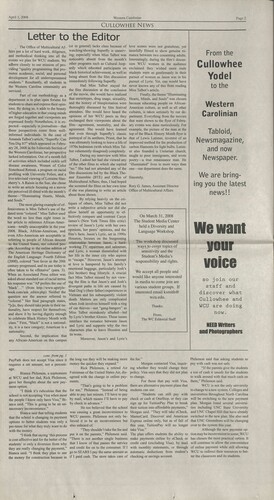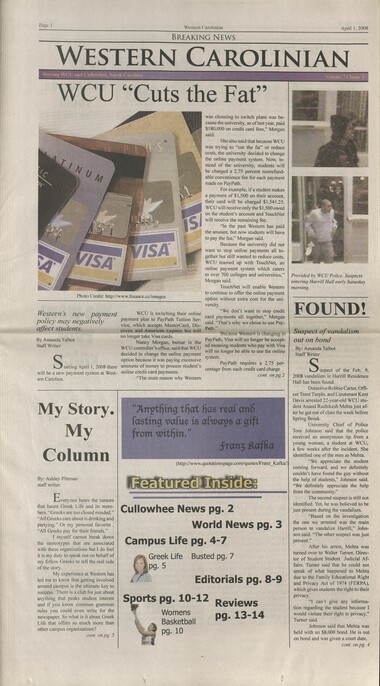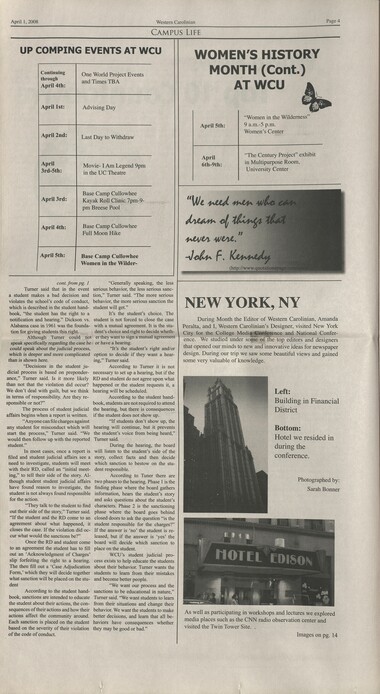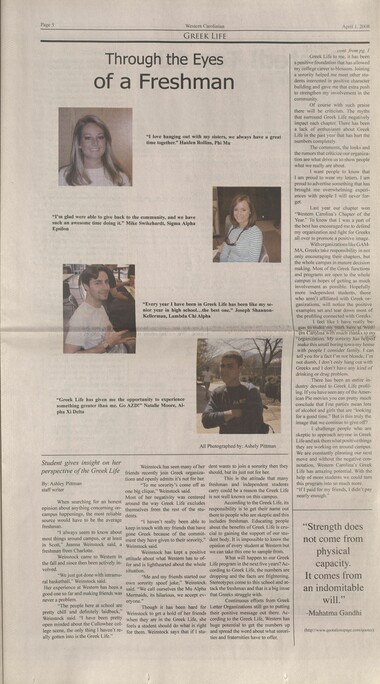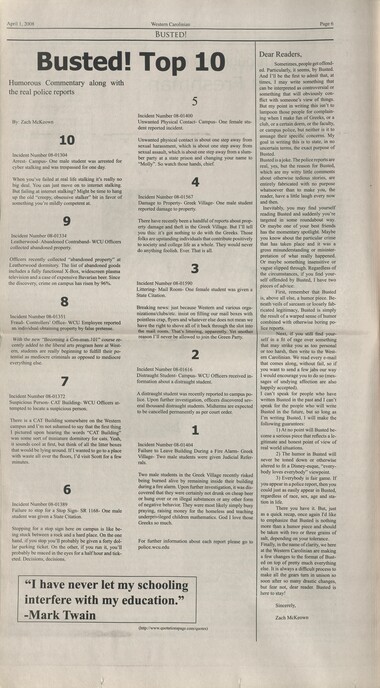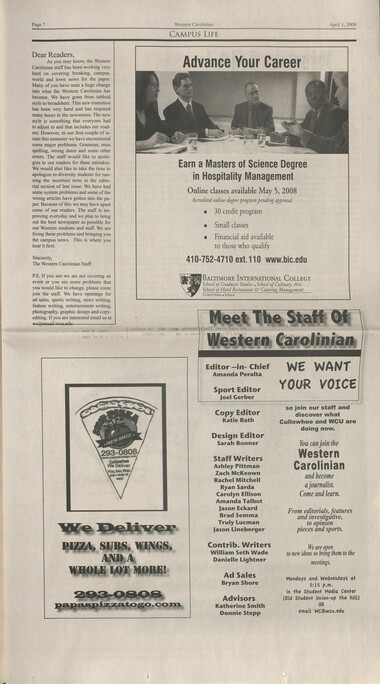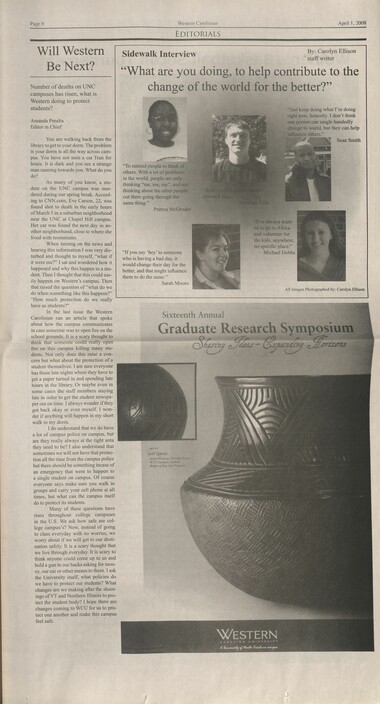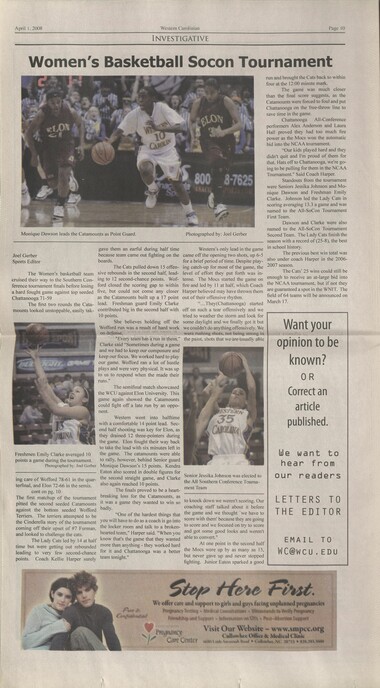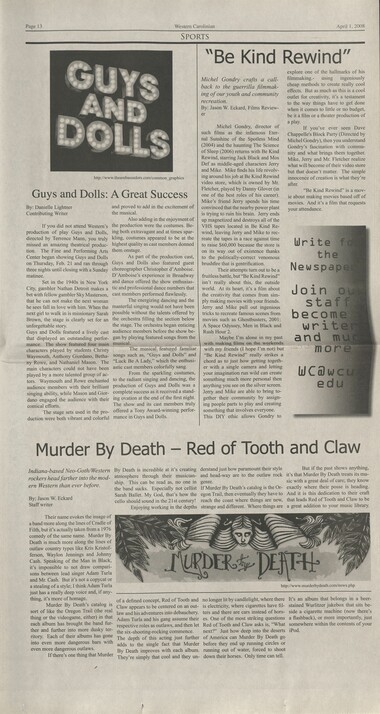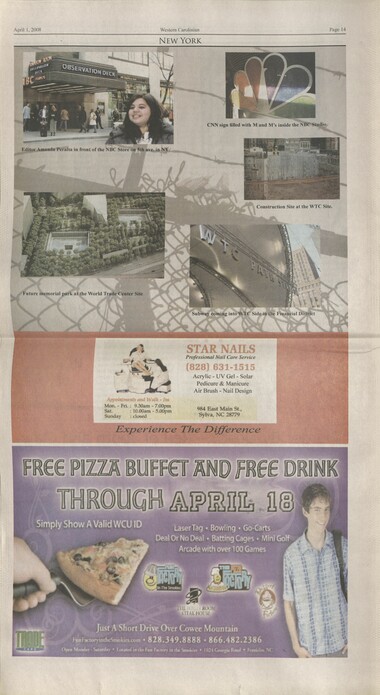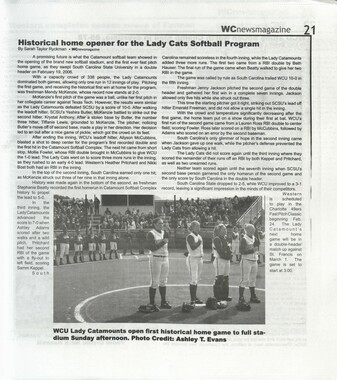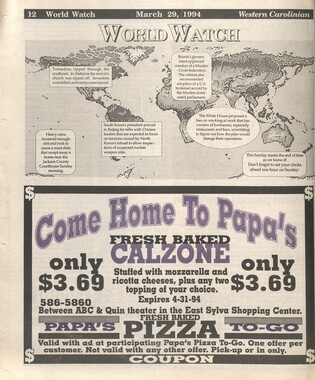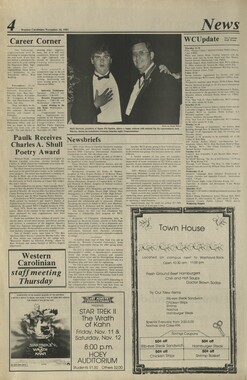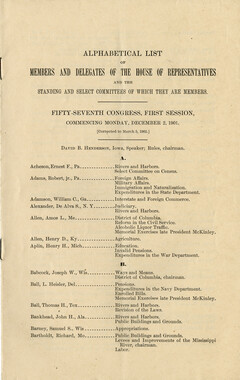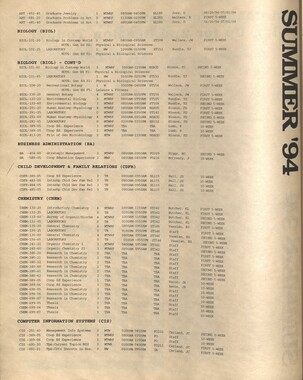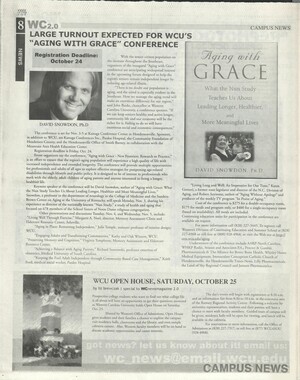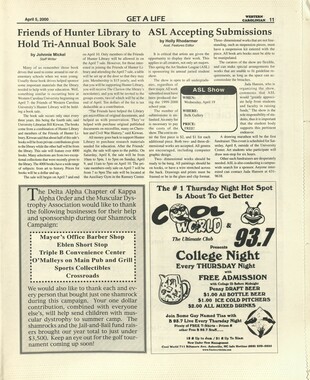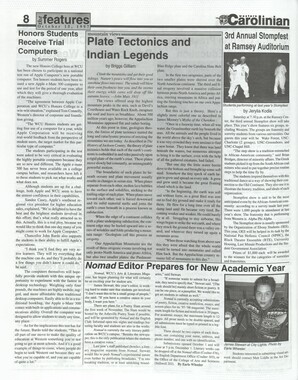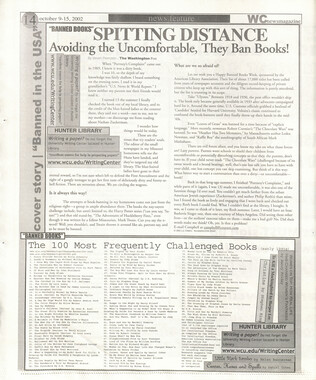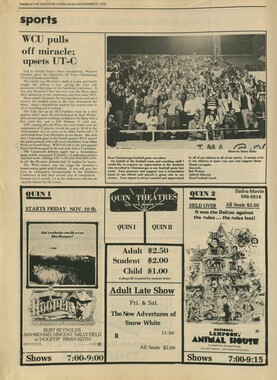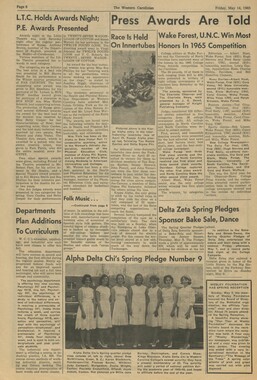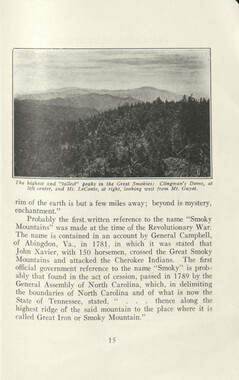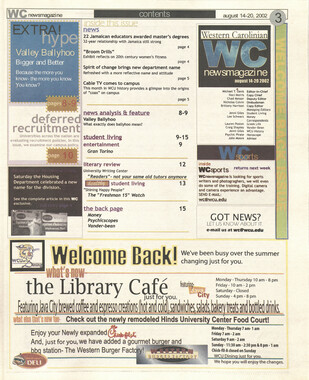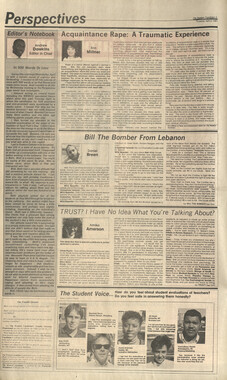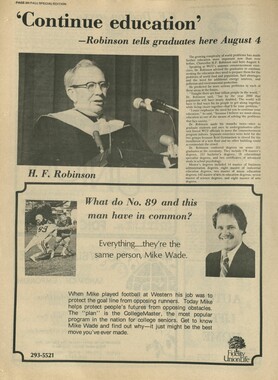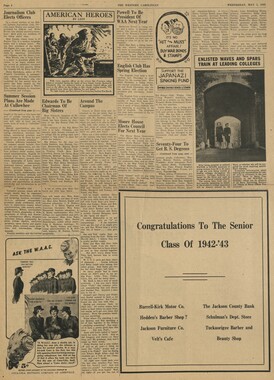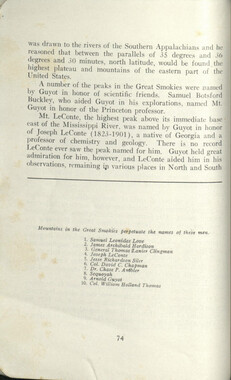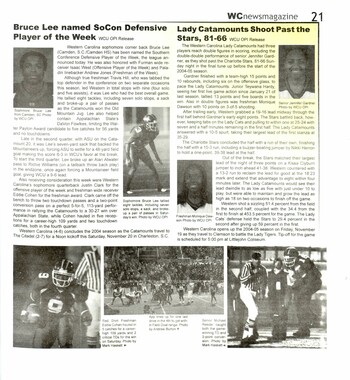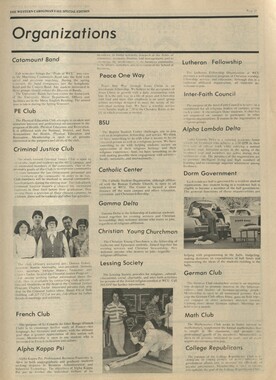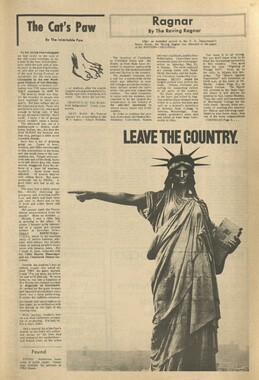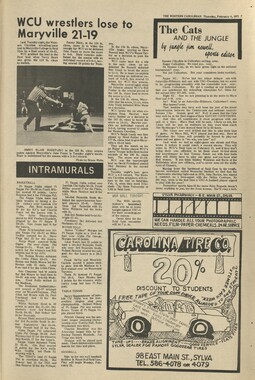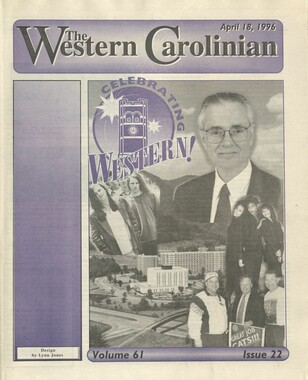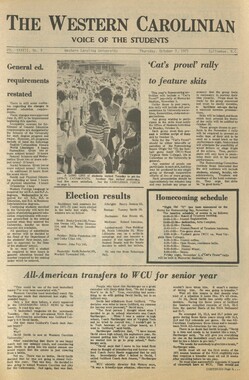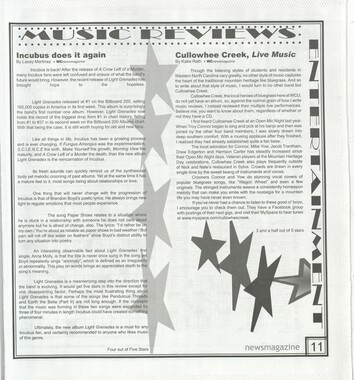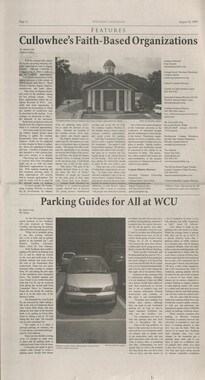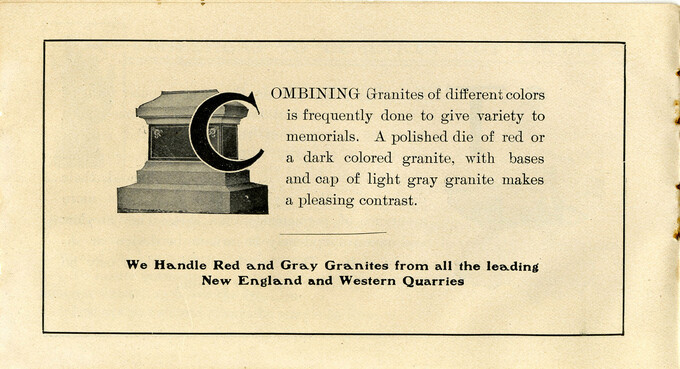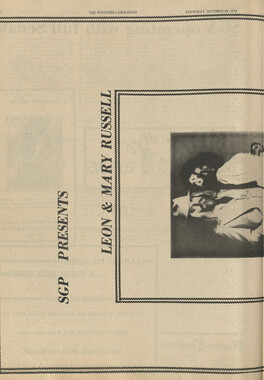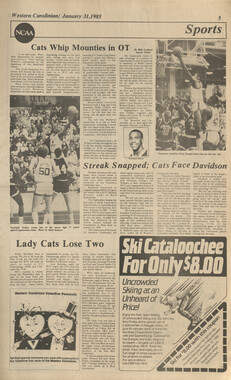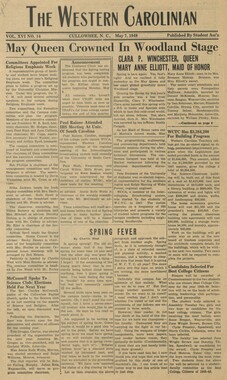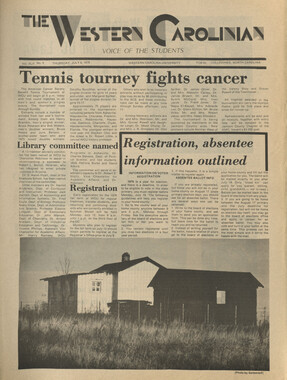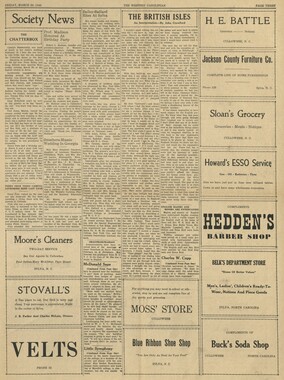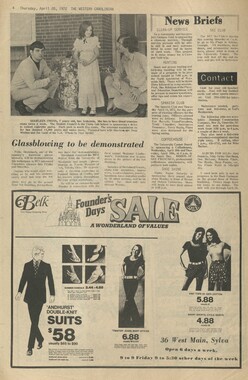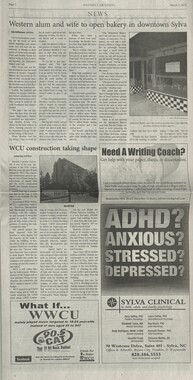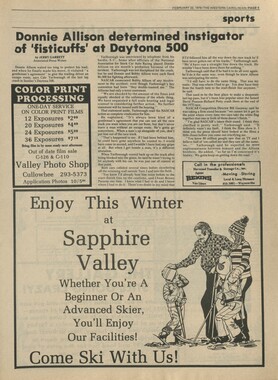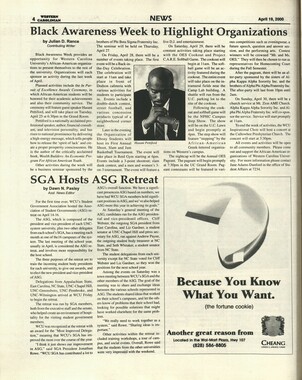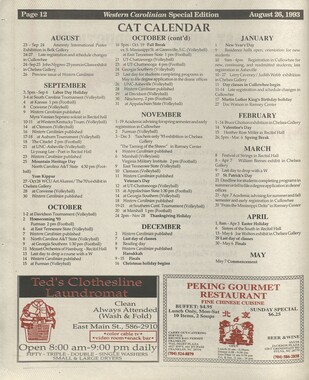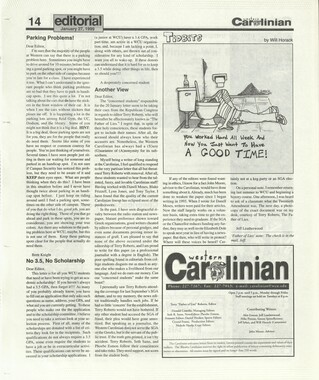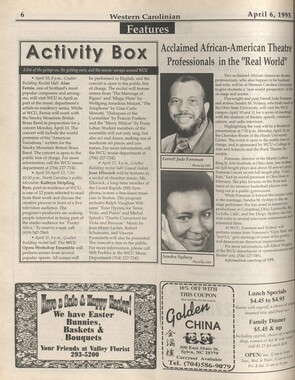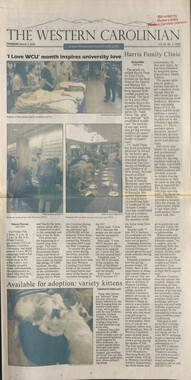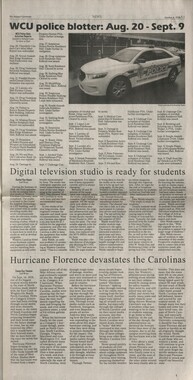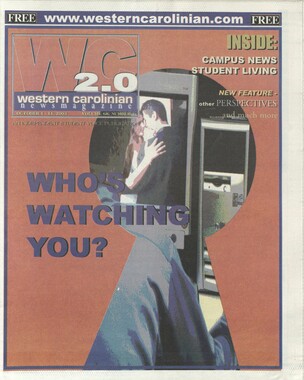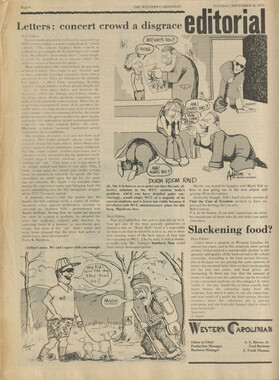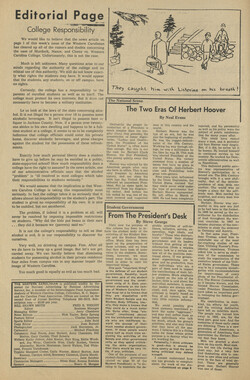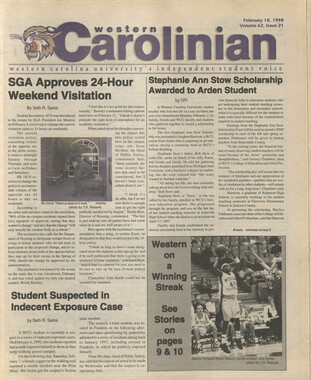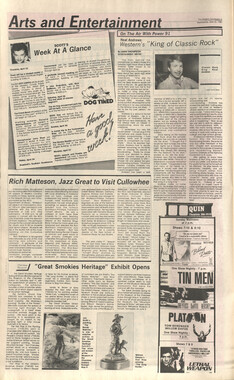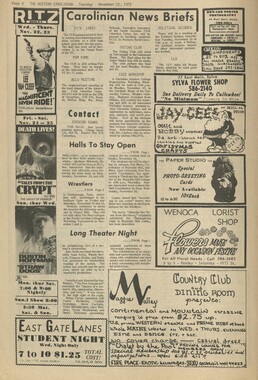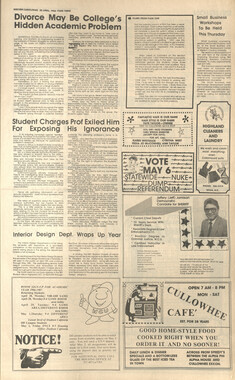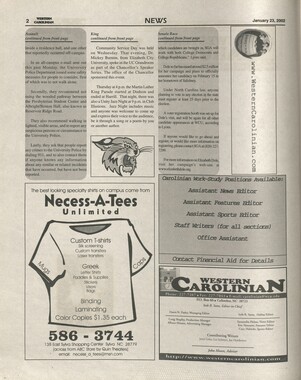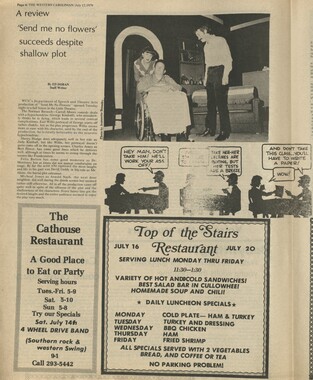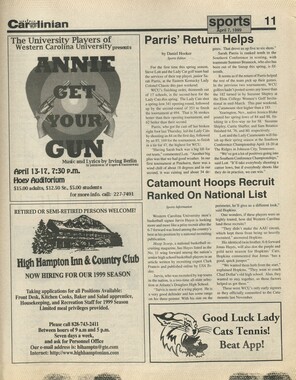Western Carolina University (21)
View all
- Canton Champion Fibre Company (2308)
- Cherokee Traditions (291)
- Civil War in Southern Appalachia (165)
- Craft Revival (1942)
- George Masa Collection (137)
- Great Smoky Mountains - A Park for America (3080)
- Highlights from Western Carolina University (422)
- Horace Kephart (998)
- Journeys Through Jackson (159)
- LGBTQIA+ Archive of Jackson County (90)
- Oral Histories of Western North Carolina (318)
- Picturing Appalachia (6617)
- Stories of Mountain Folk (413)
- Travel Western North Carolina (153)
- Western Carolina University Fine Art Museum Vitreograph Collection (129)
- Western Carolina University Herbarium (92)
- Western Carolina University: Making Memories (738)
- Western Carolina University Publications (2491)
- Western Carolina University Restricted Electronic Theses and Dissertations (146)
- Western North Carolina Regional Maps (71)
- World War II in Southern Appalachia (131)
University of North Carolina Asheville (6)
View all
- Allanstand Cottage Industries (62)
- Appalachian National Park Association (53)
- Bennett, Kelly, 1890-1974 (1463)
- Berry, Walter (76)
- Brasstown Carvers (40)
- Carver, George Washington, 1864?-1943 (26)
- Cathey, Joseph, 1803-1874 (1)
- Champion Fibre Company (233)
- Champion Paper and Fibre Company (297)
- Cherokee Indian Fair Association (16)
- Cherokee Language Program (22)
- Crowe, Amanda (40)
- Edmonston, Thomas Benton, 1842-1907 (7)
- Ensley, A. L. (Abraham Lincoln), 1865-1948 (275)
- Fromer, Irving Rhodes, 1913-1994 (70)
- George Butz (BFS 1907) (46)
- Goodrich, Frances Louisa (120)
- Grant, George Alexander, 1891-1964 (96)
- Heard, Marian Gladys (60)
- Kephart, Calvin, 1883-1969 (15)
- Kephart, Horace, 1862-1931 (313)
- Kephart, Laura, 1862-1954 (91)
- Laney, Gideon Thomas, 1889-1976 (439)
- Masa, George, 1881-1933 (61)
- McElhinney, William Julian, 1896-1953 (44)
- Niggli, Josephina, 1910-1983 (10)
- North Carolina Park Commission (105)
- Osborne, Kezia Stradley (9)
- Owens, Samuel Robert, 1918-1995 (11)
- Penland Weavers and Potters (36)
- Roberts, Vivienne (15)
- Roth, Albert, 1890-1974 (142)
- Schenck, Carl Alwin, 1868-1955 (1)
- Sherrill's Photography Studio (2565)
- Southern Highland Handicraft Guild (127)
- Southern Highlanders, Inc. (71)
- Stalcup, Jesse Bryson (46)
- Stearns, I. K. (213)
- Thompson, James Edward, 1880-1976 (226)
- United States. Indian Arts and Crafts Board (130)
- USFS (683)
- Vance, Zebulon Baird, 1830-1894 (1)
- Weaver, Zebulon, 1872-1948 (58)
- Western Carolina College (230)
- Western Carolina Teachers College (282)
- Western Carolina University (2008)
- Western Carolina University. Mountain Heritage Center (18)
- Whitman, Walt, 1819-1892 (10)
- Wilburn, Hiram Coleman, 1880-1967 (73)
- Williams, Isadora (3)
- Cain, Doreyl Ammons (0)
- Crittenden, Lorraine (0)
- Rhodes, Judy (0)
- Smith, Edward Clark (0)
- Appalachian Region, Southern (3032)
- Asheville (N.C.) (1945)
- Avery County (N.C.) (26)
- Blount County (Tenn.) (195)
- Buncombe County (N.C.) (1680)
- Cherokee County (N.C.) (283)
- Clay County (N.C.) (556)
- Graham County (N.C.) (238)
- Great Smoky Mountains National Park (N.C. and Tenn.) (535)
- Haywood County (N.C.) (3573)
- Henderson County (N.C.) (70)
- Jackson County (N.C.) (4926)
- Knox County (Tenn.) (35)
- Knoxville (Tenn.) (13)
- Lake Santeetlah (N.C.) (10)
- Macon County (N.C.) (421)
- Madison County (N.C.) (216)
- McDowell County (N.C.) (39)
- Mitchell County (N.C.) (135)
- Polk County (N.C.) (35)
- Qualla Boundary (982)
- Rutherford County (N.C.) (78)
- Swain County (N.C.) (2185)
- Transylvania County (N.C.) (270)
- Watauga County (N.C.) (12)
- Waynesville (N.C.) (86)
- Yancey County (N.C.) (72)
- Aerial Photographs (3)
- Aerial Views (60)
- Albums (books) (4)
- Articles (1)
- Artifacts (object Genre) (228)
- Bibliographies (1)
- Biography (general Genre) (2)
- Cards (information Artifacts) (38)
- Clippings (information Artifacts) (193)
- Copybooks (instructional Materials) (3)
- Crafts (art Genres) (622)
- Depictions (visual Works) (21)
- Design Drawings (1)
- Digital Moving Image Formats (2)
- Drawings (visual Works) (185)
- Envelopes (115)
- Exhibitions (events) (1)
- Facsimiles (reproductions) (1)
- Fiction (general Genre) (4)
- Financial Records (12)
- Fliers (printed Matter) (67)
- Glass Plate Negatives (381)
- Guidebooks (2)
- Internegatives (10)
- Interviews (823)
- Land Surveys (102)
- Letters (correspondence) (1070)
- Manuscripts (documents) (618)
- Maps (documents) (177)
- Memorandums (25)
- Minutes (administrative Records) (59)
- Negatives (photographs) (6090)
- Newsletters (1290)
- Newspapers (2)
- Notebooks (8)
- Occupation Currency (1)
- Paintings (visual Works) (1)
- Pen And Ink Drawings (1)
- Periodicals (194)
- Personal Narratives (10)
- Photographs (12977)
- Plans (maps) (1)
- Poetry (6)
- Portraits (4568)
- Postcards (329)
- Programs (documents) (181)
- Publications (documents) (2444)
- Questionnaires (65)
- Relief Prints (26)
- Sayings (literary Genre) (1)
- Scrapbooks (282)
- Sheet Music (2)
- Slides (photographs) (402)
- Songs (musical Compositions) (2)
- Sound Recordings (802)
- Specimens (92)
- Speeches (documents) (18)
- Tintypes (photographs) (8)
- Transcripts (329)
- Text Messages (0)
- A.L. Ensley Collection (275)
- Appalachian Industrial School Records (7)
- Appalachian National Park Association Records (336)
- Axley-Meroney Collection (2)
- Bayard Wootten Photograph Collection (20)
- Bethel Rural Community Organization Collection (7)
- Blumer Collection (5)
- C.W. Slagle Collection (20)
- Canton Area Historical Museum (2110)
- Carlos C. Campbell Collection (462)
- Cataloochee History Project (64)
- Cherokee Studies Collection (4)
- Daisy Dame Photograph Album (5)
- Daniel Boone VI Collection (1)
- Doris Ulmann Photograph Collection (112)
- Elizabeth H. Lasley Collection (1)
- Elizabeth Woolworth Szold Fleharty Collection (4)
- Frank Fry Collection (95)
- George Masa Collection (173)
- Gideon Laney Collection (452)
- Hazel Scarborough Collection (2)
- Hiram C. Wilburn Papers (28)
- Historic Photographs Collection (236)
- Horace Kephart Collection (861)
- Humbard Collection (33)
- Hunter and Weaver Families Collection (1)
- I. D. Blumenthal Collection (4)
- Isadora Williams Collection (4)
- Jesse Bryson Stalcup Collection (47)
- Jim Thompson Collection (224)
- John B. Battle Collection (7)
- John C. Campbell Folk School Records (80)
- John Parris Collection (6)
- Judaculla Rock project (2)
- Kelly Bennett Collection (1482)
- Love Family Papers (11)
- Major Wiley Parris Civil War Letters (3)
- Map Collection (12)
- McFee-Misemer Civil War Letters (34)
- Mountain Heritage Center Collection (4)
- Norburn - Robertson - Thomson Families Collection (44)
- Pauline Hood Collection (7)
- Pre-Guild Collection (2)
- Qualla Arts and Crafts Mutual Collection (12)
- R.A. Romanes Collection (681)
- Rosser H. Taylor Collection (1)
- Samuel Robert Owens Collection (94)
- Sara Madison Collection (144)
- Sherrill Studio Photo Collection (2558)
- Smoky Mountains Hiking Club Collection (616)
- Stories of Mountain Folk - Radio Programs (374)
- The Reporter, Western Carolina University (510)
- Venoy and Elizabeth Reed Collection (16)
- WCU Gender and Sexuality Oral History Project (36)
- WCU Mountain Heritage Center Oral Histories (25)
- WCU Oral History Collection - Mountain People, Mountain Lives (71)
- WCU Students Newspapers Collection (1923)
- Western North Carolina Tomorrow Black Oral History Project (69)
- William Williams Stringfield Collection (2)
- Zebulon Weaver Collection (109)
- African Americans (390)
- Appalachian Trail (35)
- Artisans (521)
- Cherokee art (84)
- Cherokee artists -- North Carolina (10)
- Cherokee language (21)
- Cherokee pottery (101)
- Cherokee women (208)
- Church buildings (190)
- Civilian Conservation Corps (U.S.) (111)
- College student newspapers and periodicals (2012)
- Dams (108)
- Dance (1023)
- Education (222)
- Floods (63)
- Folk music (1015)
- Forced removal, 1813-1903 (2)
- Forest conservation (220)
- Forests and forestry (1198)
- Gender nonconformity (4)
- Great Smoky Mountains National Park (N.C. and Tenn.) (181)
- Hunting (47)
- Landscape photography (25)
- Logging (122)
- Maps (83)
- Mines and mineral resources (9)
- North Carolina -- Maps (18)
- Paper industry (38)
- Postcards (255)
- Pottery (135)
- Railroad trains (72)
- Rural electrification -- North Carolina, Western (3)
- School integration -- Southern States (2)
- Segregation -- North Carolina, Western (5)
- Slavery (5)
- Sports (452)
- Storytelling (243)
- Waterfalls -- Great Smoky Mountains (N.C. and Tenn.) (66)
- Weaving -- Appalachian Region, Southern (280)
- Wood-carving -- Appalachian Region, Southern (328)
- World War, 1939-1945 (174)
Western Carolinian Volume 73 Number 03
Item
Item’s are ‘child’ level descriptions to ‘parent’ objects, (e.g. one page of a whole book).
-
-
April 1, 2008 Western Carolinian Co oS ee Page 2 Letter to the Editor The Office of Multicultural Af- fairs put a lot of hard work, diligence, and methodical thinking into all the events we plan for WCU students. We adhere closely to our mission of pro- viding quality programming that pro- motes academic, social, and personal development for all underrepresented students. Resultantly, all students in the Western Carolina community are serviced. Part of our methodology as a department is to plan open forums for students to share and express their opin- ions. By doing so, it adds to the beauty of higher education in that young minds are forged together and viewpoints are expressed freely. Nonetheless, it is ex- pectedespecially in journalismthat these perspectives come from well- informed individuals. In the case of Amanda Talbots article, Superfly: Can You Dig It? which appeared on Febru- ary 28, 2008 in the Editorials Section of the Western Carolinian, her perspective lacked information. Out of a month full of activities which included sickle cell disease awareness, Women of Color Sisterhood Retreat, a program on racial profiling with University Police, and a live televised viewing of Lorraine Han- . sberrys. A Raisin in the Sun, she chose to write an article focusing on a movie she perceived ill-fitted with the months themeIlluminating Hearts, Minds, and Souls. : The most glaring example of of- fensiveness is Miss Talbots use of the dated term colored. Miss Talbot used the word no less than eight times in her article to reference African-Amer- icanstotally unacceptable in the year 2008. Black, African-American, and even Afro-American are acceptable in referring to people of African descent nin the United States, not colored peo-" ple: According to the online edition of The American Heritage Dictionary of the English Language: Fourth Edition (2000), colored lost favor as. the 20th century progressed, and its use today is often taken to be offensive (para. 3). When an Associated Press editor was asked about standard use of racial terms his response was AP prefers the use of black... (from http://www.apstyle- book.com/ask_editor.php). Neither the question nor the answer referred to colored. Her final paragraph states, Tslo, they should take pride in their na- tionality, have respect for themselves; and show it by having dignity enough to celebrate Black History Month with class. First, black is nota national- ity, it is a race category; American is a nationality. Second, the implication that any African-American on this campus cont. from pg. 1 PayPath does not accept Visa since it requires a set amount, not a percent- age. Bianca Philemon, a sophomore at WCU and her dad, Rick Philemon, gave her thoughts about the new pay- ment option. T think its ridiculous that the school is not accepting Visa when most the people I know only have Visa, Bi- anca said. This is going to be an un- necessary inconvenience. Bianca said that telling students that the school is changing its payment options to better students was only a pre-tense for what they truly want to do with the money. T think that saying this process is cost affective and for the better of the students is only a diversion from why they are really changing the payment, Bianca said. I think they plan to use the money for construction because in (or in general) lacks class because of watching/showing Superfly is unnerv- ing; especially when Miss Talbot was noticeably absent from the months other programs such as Cultural Jeop- ardy which educated participants on black historical achievement, as well as being absent from the film discussion immediately following Superfly. Had Miss Talbot stayed for the film discussion at the conclusion of the movie, she would have realized that stereotypes, drug usage, sexuality, and the history of blaxploitation were thoroughly discussed by film festival attendees. She would have heard the opinions of her WCU peers as they exchanged their viewpoints about the filmagreement, neutrality, and dis- agreement. She would have learned that even through Superflys classic portrayal of its antihero, Priest, that he was ultimately looking to leave a life of 1970s hedonism (with which Miss Tal- bot vehemently disagreed) completely. During my interview with Miss Talbot, I asked her had she viewed any of the other films to which she replied no. She had not attended any of the film discussions led by the Black The- ater Ensemble (BTE) and Office of Multicultural Affairs; thus, I had hoped she screened the films on her own time if she was planning to write an article about those shown. By relying heavily on the cri- tiques of others, Miss Talbot did not write a subjective article nor did she allow herself an opportunity to ef- fectively compare and contrast Caryn Jamess (New York Times film critic) review of Jasons Lyric with her own opinions, her peers opinions, and the films facts. Jasons Lyric, set in 1990s Houston, focuses on the burgeoning relationship .between Jason, a hard- working TV repairman, and, salesman, and Lyric, a woman dissatisfied with her life in the inner city who aspires to escape. However, Jasons attempt at love is hampered by his familys emotional baggage, particularly Joshs (his brother) thug lifestyle. A crucial fact Miss Talbot missed by not view- ing the film is that Jasons and Joshs divergent paths in life are caused by Mad Dogs (their father) experiences in Vietnam and his subsequently violent death. Matters are only complicated when Josh involves himself with a ring of car thievesnot gang-bangers as Miss Talbot mistakenly alludedled by Lyrics brother Alonzo. These issues interlace the romance between Jason and Lyric and supports why the two characters plan to leave Houston and its woes. Moreover, Jasons and Lyrics the long run they will be making more money the quicker they expand. Rick Philemon, a retired Air Forceman of the United States Air, dis- agreed with the change in online pay- ments. Thats going to be a problem for me, Philemon. Instead of being able to pay last minute, Ill have to pay by mail, which means I'll have to pay by check in advance. He too believed that the school was causing a great inconvenience to WCU parents. Philemon not only be- lieved it to be an inconvenience bu also unheard of. They shouldnt take the fee and put it on the parents, Philemon said. There is not another single business that I know of that passes the service and credit fee on to the consumer. If I go to SEARS I pay the same amount as if I paid cash. The store takes care of love scenes were not gratuitous, yet tastefully filmed to show genuine ro- mance between two consenting adults. Interestingly, during the films discus- sion WCU women in the audience exclaimed they wished more male students were as gentlemanly in their pursuit of women as Jason was in his pursuit of Lyric. Yet, one would have never known any of this from reading Miss Talbots article. Finally, the theme Illuminating Hearts, Minds, and Souls was chosen because educating people on African- American culture, as well as all other cultures, is taken seriously by our de- partment. Everything from the movies that were shown to the flyer of Febru- ary events was done meticulously. For example, the picture of the man at the top of the Black History Month flyer is that of Lewis Latimer, inventor of an improved method for the production of carbon filaments for light bulbs. Latim- er also founded a Unitarian church, taught to poor immigrants, and wrote poetrya true renaissance man. He illuminated lives in more ways than oneour department does the same. Sincerely, Rory G. James, Assistant Director Office of Multicultural Affairs On March 31, 2008 The Student Media Center held a Diversity and Language Workshop. The workshop discussed | | ways fo cover topics of sensitivity and the Students Medias responsibility and rights. We accept all people and would like anyone interested in media to come join are various student groups. If interested email ksmith@ ~ -weu.edu. Thanks. From, The WC Editorial Staff the fee... Morgan contacted Visa, inquir- ing whether they would change their policy. Visa says that they did not plan to change. For those that pay with Visa, there are alternative payment plans that students can use. Students can still pay with check or cash at OneStop, or they can - sign up for TuitionPay Plan to break their tuition into affordable payments, Morgan said. They will take eCheck, MasterCard, Discover and American Express online only, but as of fall of this year, TuitionPay will no longer take Visa. The plan offers students the ability to make payments online by eCheck or credit card (excluding Visa), by mail with monthly statements, or through automatic deductions from students checking or savings account. From the Cullowhee Yodel to the Western Carolinian Tabloid, Newsmagazine, and now Newspaper. We are bring- ing you the latest news!! eer soa 0 Ween io ey Se SO 10in our start and discover what Cullowhee and WCU are doing now. * Philemon said that asking students to pay with cash was not safe. Tf the parents give the students a ton of cash it unsafe for the students to walk around with that much cash on them, Philemon said. WCU is not the only university to change to anew system. Colleges and universities throughout North Carolina will be switching to the new payment plan. Morgan listed several universi- ties including UNC State University and UNC Chapel Hill that have already switched to the new plan. She also said that UNC Greensboro will be changing over to the system this year. Although the new payment op- tion may be inconvenient to some, WCU has chosen the most practical option. It will continue to allow the convenience of online payment while still allowing WCU to redirect their resources to bet- ter the classroom and its students.
Object
Object’s are ‘parent’ level descriptions to ‘children’ items, (e.g. a book with pages).
-
The Western Carolinian is Western Carolina University's student-run newspaper. The paper was published as the Cullowhee Yodel from 1924 to 1931 before changing its name to The Western Carolinian in 1933.
-

